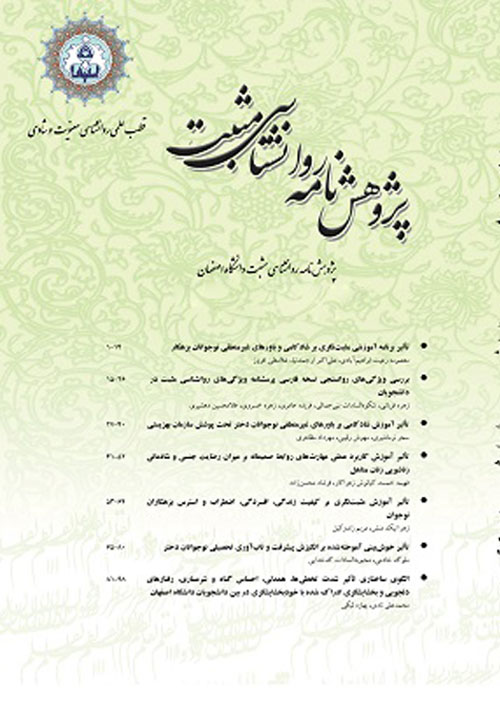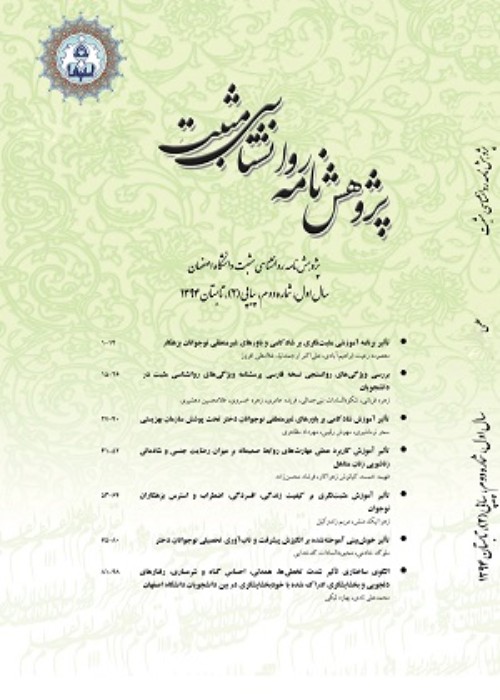فهرست مطالب

پژوهش نامه روانشناسی مثبت
سال سوم شماره 1 (پیاپی 9، بهار 1396)
- تاریخ انتشار: 1396/03/11
- تعداد عناوین: 6
-
-
صفحات 1-18هدف پژوهش، مقایسه توانمندی های محافظت کننده و بین فردی صفات شخصیتی مثبت در افراد دارای الگوهای مقابله سالم (G:الگوی سلامت و S: الگوی صرفه جو) و ناسالم (A: الگوی جاه طلب و B: الگوی فرسوده) با استرس شغلی بود. 146 نفر از کارکنان یک سازمان صنعتی در مشهد به صورت تصادفی طبقه ای انتخاب شدند و به ابزارهای پژوهش پاسخ دادند. ابزارهای استفاده شده آزمون توانمندی هاوارزش هادرعمل از پیترسون و سلیگمن و پرسشنامه رفتارها و الگوهای تجربی مرتبط با کار از شارسمیت و فیشر بودند. داده های پژوهش با روش تحلیل واریانس چندمتغیره تحلیل شد. یافته ها نشان دادند افراد دارای الگوهای سالم، توانمندی های بین فردی و محافظت کنندهبیشتری نسبت به افراد دارای الگوهای ناسالم داشتند. این یافته ها زمینه جدیدی برای پژوهش درباره نقش شخصیت در مقابله با استرس های مرتبط با کار هستند. توانمندی های شخصیتی، ویژگی های فردی آموزش دادنی هستند. بنابراین منابع ارزشمندی برای بهبود مقابله با استرس های مرتبط با کار و کاهش آثار منفی آن هستند.کلیدواژگان: استرس شغلی، توانمندی های مثبت شخصیتی، سبک های مقابله با استرس شغلی
-
صفحات 19-28هوش معنوی، چیزی بیش از توانایی ذهنی است و فرد را به فراسوی او مرتبط می کند. هدف از این پژوهش، تعیین اثر هوش معنوی بر کیفیت خواب و توجه والیبالیست های ماهر است. این مطالعه، توصیفی و از نوع همبستگی است. نمونه آماری پژوهش، 116 (76 دختر، 40 پسر) والیبالیست شهرستان مبارکه اصفهان بودند که در مسابقات منطقه ای شرکت داشتند. برای جمع آوری داده ها از پرسش نامه هوش معنوی عبدالله زاده و همکاران، پرسش نامه کیفیت خواب پیتزبورگ و آزمون توجه ماریشوک و به منظور تحلیل داده ها از تحلیل مسیر استفاده شد. یافته ها نشان داد هوش معنوی بر کیفیت خواب و توجه، تاثیر دارد و کیفیت خواب، تاثیر هوش معنوی را بر توجه میانجی گری می کند. هم چنین نتایج به دست آمده، نشان دهنده مناسب بودن برازش الگوی معادلات ساختاری بود.کلیدواژگان: هوش معنوی، کیفیت خواب، توجه، بازیکنان والیبال
-
صفحات 29-48منابع معنوی یکی از عوامل مهمی است که می توانند پیامدهای شغلی را تحت تاثیر قرار دهد، با این وجود اگرچه پژوهش های قبلی به دیگر متغیرهای تاثیر گذار از قبیل منابع شغلی و شخصی روی پیامدهای شغلی توجه کرده اند، لیکن به تاثیر منابع معنوی توجه نشده است. پژوهش حاضر به منظور آزمون الگویی از فرسودگی عاطفی شغلی، اشتیاق شغلی، قصد ترک شغل و بهزیستی شغلی به عنوان پیامدهای شغلی منابع معنوی (مقدس دانستن کار، دلبستگی ایمن به خدا، راهبردهای مقابله مذهبی مشارکتی) در کارکنان شرکت فولاد خوزستان انجام شد. به این منظور 315 نفر از کارکنان این شرکت با روش نمونه گیری تصادفی انتخاب شدند و پرسشنامه های پژوهش توسط آنان تکمیل شد. ابزارهای استفاده شده در این پژوهش عبارت بودند از مقیاس های منابع معنوی، اشتیاق شغلی، قصد ترک شغل، فرسودگی عاطفی شغلی و بهزیستی شغلی کارکنان. تحلیل داده ها با روش آماری الگویابی معادلات ساختاری و با استفاده از نرم افزارهای SPSS ویراست 18 و AMOS ویراست 22 انجام گرفت. روابط واسطه ای با استفاده از روش بوت استراپ آزمون شدند. نتایج نشان دادند که منابع معنوی هم به طور مستقیم و هم به طور غیر مستقیم از طریق فرسودگی عاطفی شغلی و اشتیاق شغلی روی بهزیستی شغلی کارکنان و قصد ترک شغل تاثیر دارند.کلیدواژگان: منابع معنوی، فرسودگی عاطفی شغلی، اشتیاق شغلی، قصد ترک شغل، بهزیستی شغلی
-
صفحات 49-60با توجه به عوارض مخرب اعتیاد و اهمیت شناسایی عوامل محافظت کننده در برابر آن، این پژوهش با هدف مقایسه نیازهای روانی بنیادی، رویدادهای استرس زای زندگی و حمایت اجتماعیدرگروه معتاد و غیرمعتاد انجام شد. روش پژوهش در دسته طرح های علی-مقایسه ای قرار دارد. گروه نمونه از میان 200 نفر از ساکنان 18 تا 60 ساله شهر خرم آباد، شامل دو گروه معتاد و غیرمعتاد (70 معتاد مراجعه کننده برای ترک و 130 فرد سالم) بودند که ازطریق نمونه گیری دردسترس انتخاب شدند و با رضایت شخصی به مقیاس های ارضای نیازهای روانی بنیادی لاگاردیا، رایان، کاچمن و دسی، مقیاس چندوجهی حمایت اجتماعی ادراک شده زیمت، پاول، فارلی، ورکمن و برکوف، مقیاس تصدیق اعتیاد وید، باچر، مک کناوبن-پوراث و پرسشنامه استرس هفتگی برانتلی، جون و بندراکس، پاسخ دادند. داده های به دست آمده با استفاده از روش تحلیل تمایزات، تجزیه و تحلیل شدند. نتایج نشان دادند ماتریس کواریانس متغیرهای پیش بین مرتبط با اعتیاد در زنان و مردان، متفاوت است. نتایج تحلیل واریانس یک راهه نشان دادند مردان معتاد و غیرمعتاد به لحاظ متغیرهای شایستگی، حمایت اجتماعی ازسوی دوستان و تعداد وقایع استرس زا با یکدیگر تفاوت معنادار داشتند و خودمختاری، شایستگی، ارتباط و حمایت اجتماعی خانواده در بین زنان معتاد و غیرمعتاد با یکدیگر متفاوت اند. تابع تشخیص نیز پیشنهاد می کند تعداد وقایع استرس زا و شایستگی بهترین پیش بینی کننده اعتیاد مردان و ارتباط و حمایت اجتماعی خانواده بهترین پیش بینی کننده اعتیاد در زنان است. نتایج با در نظر گرفتن عوامل محافظت کننده متفاوت در مردان و زنان و اهمیت آنها و همچنین احتمال ارتباط دو سویه بین اعتیاد و احساس ارضانشدن نیازهای بنیادی روانشناختی و تلویحات کاربردی آن بحث شدکلیدواژگان: نیازهای بنیادی روانشناختی، حمایت اجتماعی، استرس، اعتیاد
-
صفحات 61-75هدف از این پژوهش تعیین اثربخشی آموزش مثبت نگری بر حالت های روان شناختی مثبت (توانمندی های منش) دختران نوجوان کلاس های دوم و سوم دبیرستان بود. روش پژوهش نیمه آزمایشی با طرح پیش آزمون، پس آزمون و پیگیری بود. نمونه پژوهش چهل نفر بودند که به روش تصادفی در دو گروه کنترل و آزمایش جایگزین شدند (هر گروه بیست نفر). ابزار پژوهش پرسشنامه حالت های روان شناختی مثبت (رجایی، خوی نژاد و نسائی) بود. گروه آزمایش نه جلسه نوددقیقه ای (به مدت دو ماه) آموزش مثبت نگری دریافت نمود و گروه کنترل مداخله ای دریافت نکرد. نتایج حاصل از تحلیل کوواریانس تک متغیره در مرحله پس آزمون و پیگیری نشان داد که آموزش مثبت نگری در افزایش حالت های روان شناختی مثبت )توکل به خدا، خوش بینی، خودکارآمدی، وظیفه شناسی، احساس کنترل، هدفمندی، امیدواری، رضایت از زندگی، زندگی معنادار، خلق مثبت و شادمانی، اجتماعی بودن، عزت نفس و احساس ارزشمندی، احساس آرامش، قدردانی و بخشش( گروه آزمایش موثر بوده است.کلیدواژگان: آموزش مثبت نگری، حالت های روان شناختی مثبت، توانمندی های منش
-
Pages 1-18The aim of the study was to compare the protective and interpersonal strengths as positive personality traits in employees with healthy (G: good health pattern, S: sparing pattern) and unhealthy (A: ambitious pattern, B: burnout pattern) job stress coping styles. Therefore, 146 employees of an industrial organization in Mashhad were selected by stratified random sampling and asked to respond to research tools. The instruments were the Values in Action Inventory of Strengths from Peterson & Seligman and Work-related Behavior and Experience Patterns Questionnaire from Schaarschmidt & Fischer. The results of multivariate analysis of variance showed that employees with healthy coping styles had higher means of protective and interpersonal strengths than unhealthy subjects. These findings open a new field for research on the role of personality in coping with work-related stress. Character strengths are trainable personal characteristics. Therefore, they are valuable resources to improve coping with work-related stress and to decreasing its negative effects.Keywords: job stress, positive character strength, coping styles with job stress
-
The effect of spiritual intelligence on quality of sleep and attention of skilled volleyball playersPages 19-28Spiritual intelligence is something more than mental ability and connects an individual to beyond. The aim of this study was to assess the effect of spiritual intelligence on sleep quality and attention of skilled volleyball players. Therefore 116 (76 female, 40 male) volleyball players of Mobarakeh county in Isfahan who had participated in regional competitions were selected. Abdollazadehs Spiritual Intelligence Questionnaire, Pittsburgh Sleep Quality, and Mari shook Test were used to measure the data. Results of path analysis showed that spiritual intelligence affects both sleep quality and attention. Moreover, the quality of sleep mediated the effect of spiritual intelligence on attention, and the results showed the appropriateness of structural equation model fit.Keywords: spiritual intelligence, sleep quality, attention, volleyball players
-
Pages 29-48Spiritual resources is one of the important factors that could affect job outcomes. The purpose of this research was to design and test the effect of spiritual resources (sacred calling to the work, secure attachment to God, and collaborative religious coping) on turn-over intention and work-place well-being with the mediation of emotional exhaustion and work engagement. turnover intention and work well-being as job outcomes of spiritual resource in Khuzestan Steel Company employees. Therefore, through convenient sampling, 315 employees were selected and and asked to complete the following qustionnaires: Dik, Eldridge and Steger Calling and Vocation Scale, Beck and McDonald Attachment to God Scale, Pargament, Kennell, Hathaway, Grevengoed, Newman, and Jones Religious Problem Solving Scale, Schaufeli, Bakker, and Salanova Work Engagement Scale, Bozeman and Perrewé Turnover Intention Scale, Schaufeli, Leiter, Maslach, and Jackson Emotional Exhaustion Scale, and Zheng, Zhu, Zhao, and Zhang Workplace Well-being of Employee Scale. Statistical data was analyzed using structural equation modeling. Mediator effects were tested using the bootstrap method. The results showed that the spiritual resources both directly and indirectly through emotional exhaustion and work engagement have significant effects on the work well-being of employees and turnover intention. The results also indicated that spiritual resources, despite cultural and religious differences, can increase the perception of control, the sense of meaning and calling and flexibility in the employees, thereby reducing emotional exhaustion and increasing work engagement.Keywords: spiritual resources, emotional exhaustion, work engagement, turnover intention, work well-being
-
Pages 49-60The aim of this study was to compare basic psychological needs, stressful life events, and social support in addicts and non-addicts. The study was a causal-comparative research. Two hundreds residents of Khorramabad were chosen by available sampling (130 healthy and 70 addicts) and were asked to respond to Basic Psychological Need Scale La Guardia, Ryan, Couchman & Deci, Multi-facet Perceived Social Support Scale Zimet, Powell, Farley, Werkman, & Berkoff, Addiction Acceptance Scale Weed, Butcher, McKenna, & Ben-Porath, and Weekly Stress Inventory Brantley, Jones & Boudreaux. Results of analysis of variance and and discriminant analysis showed singnificant differences between men and women. The results also showed significant differences competency and friend social support in the two groups of men, and autonomy, competency and family social support in the two groups of women. Discriminant analysis revealed that stressful life events and competency predict addiction in men. and relationship and family social support predict addiction in women.Results were discussed according to different protecting factors in men and women and possible reciprocal relationships between addiction and protecting factors.Keywords: Basic Psychological Needs, Social Support, Stress, Addiction
-
Pages 61-75psychological states of female students in second and third grades of high school. The research method was quasi-experimental with pre-test, post-test and follow-up. The sample consisted of forty students selected randomly in two groups (twenty students in each group). To collect data, Positive Psychological State Inventory (Rajaei, Khuy Nzhad and Nesaei) was used. The experimental group received ninety minute positive training sessions (for two months) and the control group did not receive treatment. The results of analysis of covariance showed that positive training had positive effects on positive psychological states (trust in God, optimism, self-efficacy, duty, sense of control, targeted, hope, satisfaction with life, meaningful life, pleasant, sociability, self-esteem and self-worth, sense of peace, gratitude, and forgiveness) among adolescents both in the post and follow-up testsKeywords: Positive Thinking Training, positive Psychological States, Character Strengths


